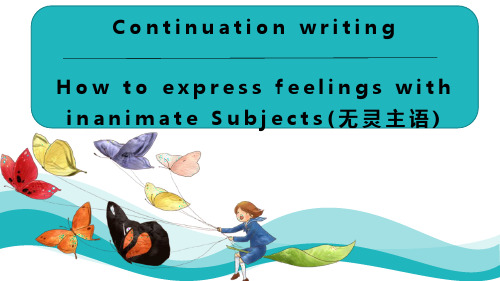“无灵主语”与翻译解读PPT教学课件
合集下载
读后续写写作之无灵主语表达情绪课件

A hush fell upon the classroom. __教__室__一___片__寂__静__。__
The thick fog blanketed the field. 浓雾笼罩着整个大地。 An earthquake came like a thief in the night,without warning. 地震到来,犹如夜贼,不作预告。 The rain prevented tourists from enjoying the full moon. 雨使得游客无法欣赏到满月。
1.突然下了一阵雨,风停了。
A sudden shower _k_il_le_d___ the wind.
2.这个城市刚下过一场大雨。
A heavy rain __v_is_i_te_d__ the city.
A terrible thought suddenly struck me. 我突然想到一个可怕的想法。 The sight of the scene filled me with horror. 想到这个情景我心中充满了恐惧。
pleasure 激动 thrill excitement 放松 relief relaxation 热情passion enthusiasm 自豪pride 满意 satisfaction contentment 惊讶surprise shock amazement astonishment 同情sympathy
我给她礼物时,她的脸上焕发出了光彩。
Her face brightened/lit up when I gave her the present
.
他笑得一脸皱纹。
Smile crumpled his face
.
The thick fog blanketed the field. 浓雾笼罩着整个大地。 An earthquake came like a thief in the night,without warning. 地震到来,犹如夜贼,不作预告。 The rain prevented tourists from enjoying the full moon. 雨使得游客无法欣赏到满月。
1.突然下了一阵雨,风停了。
A sudden shower _k_il_le_d___ the wind.
2.这个城市刚下过一场大雨。
A heavy rain __v_is_i_te_d__ the city.
A terrible thought suddenly struck me. 我突然想到一个可怕的想法。 The sight of the scene filled me with horror. 想到这个情景我心中充满了恐惧。
pleasure 激动 thrill excitement 放松 relief relaxation 热情passion enthusiasm 自豪pride 满意 satisfaction contentment 惊讶surprise shock amazement astonishment 同情sympathy
我给她礼物时,她的脸上焕发出了光彩。
Her face brightened/lit up when I gave her the present
.
他笑得一脸皱纹。
Smile crumpled his face
.
读后续写之巧用无灵主语(提分版)课件-高三上学期英语二轮复习专项

答案:
1.(2021年全国I卷)All of a sudden, the twin’s face lit up with their head nodding firmly.
2.He stood by the door and his face brightened/ lit up with delight/joy.
二、无灵主语inanimate subject 无灵主语(inanimate subject),又叫做物称主语, 指的是使用没有生命的事物充当句子的主语成分,例 如情感、动作、时间、地点、物品等,这与中文表达 中习惯“以人为本”的特点——即常常会把人这个行为主 体作为句子主语的情况大相径庭,体现了英语语言所 强调的“客体思维”,使得语言描写生动形象(vivid description)。简言之,主语不是人(lifeless nouns)
4、那些日子里,一种沮丧攫住了我。
A depression_tore_____ me those days.
句式2:主语(身体部位/音容笑)+有灵动词 +其它 1、这类名词有: face/eye/heart/fingers/tears/smile/voice 2、有灵动词有:one’s face brighten/light up(露出喜色), tears well up(涌出), spread across(浮现) 3、名著中的无灵主语: (1)My fingers shook with anger, so that I could not go on sewing.《简爱》 (2)I was relieved when a bright, sweet voice interrupted us.《简爱》
3、感动:I was so moved that I failed to say a word.我感 动得一句话也说不出来。
“无灵主语”与翻译解读复习课程

在对经理实行奖赏制度时,可观的金钱真
的能够买来可观的业绩吗?
(“有灵谓语”buy的“灵性”保存。)
“无灵主语”与翻译
8
把英语“无灵主语”译为汉语的谓语
或谓语的一部分
“无灵主语”毕竟是英语语言的一个强项,如 果想在这个方面与之抗衡,汉语未免感到牵强 生硬、力不从心。因此,一些英语“无灵主语” 在汉译之时只能忍痛割爱,译作其它成分,以 符合汉语语言之规范。对英语“无灵主语”进 行“割爱”,方法不限一种。其中之一,便是 将之译为汉语的谓语或谓语的一部分。
“无灵主语”与翻译
20
把英语“无灵主语”译为汉语的宾语
与状语相比,把“无灵主语”译为汉语的 宾语的情况要少得多,但它毕竟存在。例 如:
“无灵主语”与翻译
21
Grief bowed them down. 他们不胜悲伤。
“无灵主语”与翻译
22
A philosophical tone pervades the poem.
语言表达能力和增进修辞效果的一种有力手段,“无灵
主语”受到英语和汉语的青睐,在口语、书面语、和成
语当中都有运用。例如,汉语成语:祸不单行,福不双 至。英语习语:Actions speak louder than words等等。 但是,两种语言在“无灵主语”与“有灵谓语”/“无
灵谓语”的搭配方面仍然存在着巨大差异,因此,在翻
欢迎他的,只有几下轻轻的、零零落落的、 半心半意的掌声。
“无灵主语”与翻译
12
Fortune smiled on him and he was soon promoted. 他际遇好,很快就提升了。
“无灵主语”与翻译
13
Anger choked his words. 他气得说不出话来。
的能够买来可观的业绩吗?
(“有灵谓语”buy的“灵性”保存。)
“无灵主语”与翻译
8
把英语“无灵主语”译为汉语的谓语
或谓语的一部分
“无灵主语”毕竟是英语语言的一个强项,如 果想在这个方面与之抗衡,汉语未免感到牵强 生硬、力不从心。因此,一些英语“无灵主语” 在汉译之时只能忍痛割爱,译作其它成分,以 符合汉语语言之规范。对英语“无灵主语”进 行“割爱”,方法不限一种。其中之一,便是 将之译为汉语的谓语或谓语的一部分。
“无灵主语”与翻译
20
把英语“无灵主语”译为汉语的宾语
与状语相比,把“无灵主语”译为汉语的 宾语的情况要少得多,但它毕竟存在。例 如:
“无灵主语”与翻译
21
Grief bowed them down. 他们不胜悲伤。
“无灵主语”与翻译
22
A philosophical tone pervades the poem.
语言表达能力和增进修辞效果的一种有力手段,“无灵
主语”受到英语和汉语的青睐,在口语、书面语、和成
语当中都有运用。例如,汉语成语:祸不单行,福不双 至。英语习语:Actions speak louder than words等等。 但是,两种语言在“无灵主语”与“有灵谓语”/“无
灵谓语”的搭配方面仍然存在着巨大差异,因此,在翻
欢迎他的,只有几下轻轻的、零零落落的、 半心半意的掌声。
“无灵主语”与翻译
12
Fortune smiled on him and he was soon promoted. 他际遇好,很快就提升了。
“无灵主语”与翻译
13
Anger choked his words. 他气得说不出话来。
“无灵主语”与翻译解读

“无灵主语”与翻译
33
Her years sit light on her. 她上了年纪,但不显老。
“无灵主语”与翻译
34
All his efforts were dedicated to the downfall of the enemy and his regaining of power in the party. 他做出种种努力,意在瓦解敌人,并在 党内重新掌权。
“无灵主语”与翻译
35
融合译法
所谓“融合译法”,指的是在翻译含有 “无灵主语”的英语句子时,先结合其 它句子成分进行通盘考虑(当然,有时 也需要结合更大的篇章结构来进行考 虑),再进行汉译。这样一来,英语的 “无灵主语”便被“融化合并”在汉语 的句子当中。
“无灵主语”与翻译
36
Reading supplies him with endless entertainment. 他读书,其乐无穷。 (把英语的Reading和him进行融合, 译为汉语单句“他读书”。)
“无灵主语”与翻译
“无灵主语”及相关概念 根据所指的不同性质来划分,名词可以分为“有灵名 词”( animate noun)和“无灵名词”( inanimate noun)两种类型。在句子当中,“有灵名词”做主语 叫作“有灵主语”(animate subject),“无灵名词” 做主语叫作“无灵主语”( inanimate subject )。 (吴群, 2002)为了讨论问题的方便,我们在此拈出 另外两对概念:“有灵动词”、“无灵动词”、“有 灵谓语”、“无灵谓语”。“有灵动词”作谓语叫作 “有灵谓语”,“无灵动词”作谓语叫作“无灵谓 语”。
“无灵主语”与翻译
29
把英语“无灵主语”译为汉语的句子 在英译汉的过程中,把英语的“无灵主语”进 行扩展,翻译成汉语的一个句子,也是经常遇 到的一种情况。英汉双语比照之下,我们仍会 觉得英语的表达似乎更加简练、生动、形象、 俏皮。
人教新课标 高三英语一轮复习 无灵主语句,让写作地道且灵动 课件

4.上周五下午,我们学校和德国姐妹学校在操场上进行了一场足球友谊赛。
L__a_s_t _F_ri_d_a_y__a_ft_e_rn__o_o_n_w__it_n_e_s_s_e_d a friendly football match between our
school and the German sister school on the playground.(报导)
想到考试的失败,他万念俱灰。 5. An embarrassed laugh escapes my throat. 我不由自主尴尬地笑了一声。
escape “声音(不自觉地)” 由...发出
6.Disappointment took possession of me due to the failure of my exam. 考试失败让我很失望。
preparations. All the words slipped my mind absolutely. After class, m
在这些情感名词之后,带上动词如seize, grip,visit, haunt, come over, well up, take possession of 等,就能写出精彩的情感无灵主语。
Category 3:主语是具有动词意味的名词
eg: A ten minutes' walk brought us to the destination.
delight — delight;
despair—despair;
disappointarrassment; eager — eagerness;
happy — happiness;
horrify — horror; joy — joy;
读后续写:无灵主语+课件-2025届高三英语上学期一轮复习专项

3.她慢慢走出屋子,内疚和担忧一阵阵涌上她的心头。
She slowly walked out of the room, and guilt and worry (主语)
flooded /swept/rushed / came over (动词) her in waves. 3.他开车驶过那座桥时,阵阵孤独与痛苦涌上心头。
■续写句式3表思想/动作行为的名词+有灵动词(sb.feel/do...) ■续写句式4 表自然现象等的名词+有灵动词(描写环境氛围) ■续写句式5表时间和地点的名词+有灵动词
①The following year saw the death of his mother. 第二年他的妈妈去世了。 ②Shanghai witnessed many great historical events. 上海发生了许多重大历史事件。 ③A hush fell upon the assembly会场一片寂静
1.A storm was gathering, but we stayed there until thunder and lightning crashed.暴风雨即将来临,但我们一直待在那里,直到雷电交加。 2.The sun has come out.太阳出来了。 3.A heavy rain visited the city.这个城市刚下过一场大雨。
■续写句式1 (a burst/ wave/ surge/ rush/ ripple/ sense/ feeling of 十)表情感状态的名词+有灵动词+sb. 表“某人感到……”或“一阵/一种……向某人袭来”
①Suffering and despair defeated me, and I fell sobbing on the doorstep. 痛苦和绝望击垮了我,我倒在门阶上哭泣。《简·爱》 ②Mary felt a wave of anger sweep over her. 玛丽感到一阵愤怒。《秘密花园》 ③The polar bear came near. Horror slowly crept on us. 北极熊走近了。恐惧慢慢向我们袭来。(2020·浙江高考)
无灵主语公开课 课件--高三英语专题复习

stream/roll down
......
/pour down
eg: 笑声在房间里萦绕。 Laughter lingered around the room.
句式2:_身__体__部__位__和__音__容__词___ +动词+其他成分
Exercise
1. 他的身体冷得发抖。 His body trembled with cold. 2. 兴奋的泪水从她的双眼涌出来了。 Tears of excitement welled up in her eyes. 3. 我给她礼物时,她的脸上焕发出了光彩。 Her face brightened/lit up when I gave her the present.
Category 2:body parts/contenance(面容表情)
身体部位和音容词
心 脸 身体 手掌 眼泪 笑声heart face body palm tears laghter
有灵动词
颤抖
shake, tremble
照亮
light up, brighten
存留/萦绕 linger
流下
句式5. 地__点__/时__间__+动词+其他成分
A Brief Summary
emotion
侵袭_s_e_iz_e__使哽咽_c_h_o_k_e_充满某种情感_f_lo_o_d__o_v_e_r_ 涌出w__e_ll_u_p__ 抓住_ta_k__e_h_o_l_d_o_f_
body parts/ countenance (面容表情)
Chang'e 5 successfully returns home with lunar samples
高三英语二轮复习课件 :读后续写之无灵主语

To avoid repetition
Mom tried to conceal her emotion, but the glittering tears failed her.
2. Mom tried to conceal[kənˈsiːl] her emotion, but she burst into tears the next moment.
how
1.看到这个情景,我心中满是恐惧。
The sight of the scene frightened me.
3.想到马上就能见到她的儿子,她觉得幸福满满。
The thought of your graduation pains me .
2.想到你们即将毕业,我很难过。
how
The thought of seeing her son very soon filled her heart with great happiness.
animate verb(有灵动词)
有生命的事物的动作和行为,如:see, find, bring, give, escape, witness, seize...
what
1. Mary felt a wave of anger swept over her. 《秘密花园》2. A storm was gathering, but we stayed there until thunder and lightning crashed. 《简∙爱》3. The moment he shut the door, he caught the glimpse of the fierce eyes and hungry look of the wolf by the door. A cold feeling crept over his heart and made him shiver. (2017年浙江高考读后续写)4. My heart sank. What I had been looking forward to—a dreamy new football outfit would finally give way to family expenses. (2021年7月浙江高考续写)
Mom tried to conceal her emotion, but the glittering tears failed her.
2. Mom tried to conceal[kənˈsiːl] her emotion, but she burst into tears the next moment.
how
1.看到这个情景,我心中满是恐惧。
The sight of the scene frightened me.
3.想到马上就能见到她的儿子,她觉得幸福满满。
The thought of your graduation pains me .
2.想到你们即将毕业,我很难过。
how
The thought of seeing her son very soon filled her heart with great happiness.
animate verb(有灵动词)
有生命的事物的动作和行为,如:see, find, bring, give, escape, witness, seize...
what
1. Mary felt a wave of anger swept over her. 《秘密花园》2. A storm was gathering, but we stayed there until thunder and lightning crashed. 《简∙爱》3. The moment he shut the door, he caught the glimpse of the fierce eyes and hungry look of the wolf by the door. A cold feeling crept over his heart and made him shiver. (2017年浙江高考读后续写)4. My heart sank. What I had been looking forward to—a dreamy new football outfit would finally give way to family expenses. (2021年7月浙江高考续写)
- 1、下载文档前请自行甄别文档内容的完整性,平台不提供额外的编辑、内容补充、找答案等附加服务。
- 2、"仅部分预览"的文档,不可在线预览部分如存在完整性等问题,可反馈申请退款(可完整预览的文档不适用该条件!)。
- 3、如文档侵犯您的权益,请联系客服反馈,我们会尽快为您处理(人工客服工作时间:9:00-18:30)。
2020/10/16
“无灵主语”与翻译
3
“无灵名词”可分为两大类:抽象名词(abstract noun) 和无生命名词(lifeless noun)。无论抽象名词或是无生 命名词做主语,都叫作“无灵主语”。抽象名词做主语,
往往能使语言简洁有力、生动形象;无生命名词做主语,
常常使语言带上拟人色彩,富有诗意。因此,作为提高
译含“无灵主语”类句子时,我们就需要认真斟酌,不 可率尔操觚,以免铸成大错。
2020/10/16
“无灵主语”与翻译
4
英语“无灵主语”在英译汉当中的处理
把英语“无灵主语”直译为汉语“无灵主语”
有时,英语的“无灵主语”可以直接翻译成汉 语的“无灵主语”。但是,当英语句子结构是 “无灵主语 + 有灵谓语”时,汉译在保持英语 “无灵主语”的同时,往往不能保存英语的 “有灵谓语”。这就是为什么当我们阅读此类 汉语译文时,总是有种若有所失的感觉。请看 以下译例:
2020/10/16
“无灵主语”与翻译
5
The above facts insist on the following conclusions. 上述事实使人们不能不得出以下结论。
2020/10/16
“无灵主语”与翻译
6
Bottling up your feelings leads to trouble. 压抑感情会引起问题。 (“有灵谓语”lead to的“灵性”丧失。)
有了时间表,你便按部就班、自在自如,
而一旦受到打扰,你便感到气愤懊恼。
(译为条件状语。)
2020/10/16
“无灵主语”与翻译
17
But at last Brown reckoned that he could stand it no longer. The thought of it made him so wild that he couldn’t work.
欢迎他的,只有几下轻轻的、零零落落的、 半心半意的掌声。
2020/10/16
“无灵主语”与翻译
13
Fortune smiled on him and heபைடு நூலகம்was soon promoted. 他际遇好,很快就提升了。
2020/10/16
“无灵主语”与翻译
14
Anger choked his words. 他气得说不出话来。
2020/10/16
“无灵主语”与翻译
7
Hunger obviously weakens the children in Africa.
在非洲,饥饿明显地使孩子们的身体变得 衰弱。
2020/10/16
“无灵主语”与翻译
8
When it comes to rewarding managers, does top dollar really buy top performance?
语言表达能力和增进修辞效果的一种有力手段,“无灵
主语”受到英语和汉语的青睐,在口语、书面语、和成
语当中都有运用。例如,汉语成语:祸不单行,福不双 至。英语习语:Actions speak louder than words等等。 但是,两种语言在“无灵主语”与“有灵谓语”/“无
灵谓语”的搭配方面仍然存在着巨大差异,因此,在翻
但最后布朗觉得自己已忍无可忍了。一 想起这事他就狂躁得无法工作。
(译为条件状语。)
2020/10/16
“无灵主语”与翻译
2020/10/16
“无灵主语”与翻译
15
把英语“无灵主语”译为汉语的状语
其实,把英语“无灵主语”译为汉语的状 语,也是比较普遍的一种做法。译为汉语 的状语,常见的有:条件状语、原因状语、 时间状语等。例如:
2020/10/16
“无灵主语”与翻译
16
Maintaining a schedule gives you a feeling of control, and interruptions annoy you.
在对经理实行奖赏制度时,可观的金钱真
的能够买来可观的业绩吗?
(“有灵谓语”buy的“灵性”保存。)
2020/10/16
“无灵主语”与翻译
9
把英语“无灵主语”译为汉语的谓语
或谓语的一部分
“无灵主语”毕竟是英语语言的一个强项,如 果想在这个方面与之抗衡,汉语未免感到牵强 生硬、力不从心。因此,一些英语“无灵主语” 在汉译之时只能忍痛割爱,译作其它成分,以 符合汉语语言之规范。对英语“无灵主语”进 行“割爱”,方法不限一种。其中之一,便是 将之译为汉语的谓语或谓语的一部分。
2020/10/16
“无灵主语”与翻译
2
作为相反相成的一对概念,“有灵”与
“无灵”的区别,全在于是否涉及到人, 或者是否涉及到与人相关联的动作。涉及 到者,即为“有灵”;不涉及到者,即为 “无灵”。例如:The year of 1949 saw
the founding of the People’s Republic of China. 其中,the year of 1949是“无灵主 语”,saw是“有灵动词”充当的“有灵 谓语”。
2020/10/16
“无灵主语”与翻译
10
Warmth flooded my heart. 我心里热呼呼的。
2020/10/16
“无灵主语”与翻译
11
Chaos reigned in the classroom. 教室里大乱。
2020/10/16
“无灵主语”与翻译
12
Only a very slight and very scattering ripples of half-hearted hand-clapping greeted him.
“无灵主语”与翻译
“无灵主语”及相关概念
根据所指的不同性质来划分,名词可以分为“有灵名 词”(animate noun)和“无灵名词”(inanimate noun)两种类型。在句子当中,“有灵名词”做主语 叫作“有灵主语”(animate subject),“无灵名词” 做主语叫作“无灵主语”(inanimate subject)。 (吴群,2002)为了讨论问题的方便,我们在此拈出 另外两对概念:“有灵动词”、“无灵动词”、“有 灵谓语”、“无灵谓语”。“有灵动词”作谓语叫作 “有灵谓语”,“无灵动词”作谓语叫作“无灵谓 语”。
